MIDDLE EAST CRISIS
Global South scholars explain their solidarity with Palestine, and why they can’t stay silent
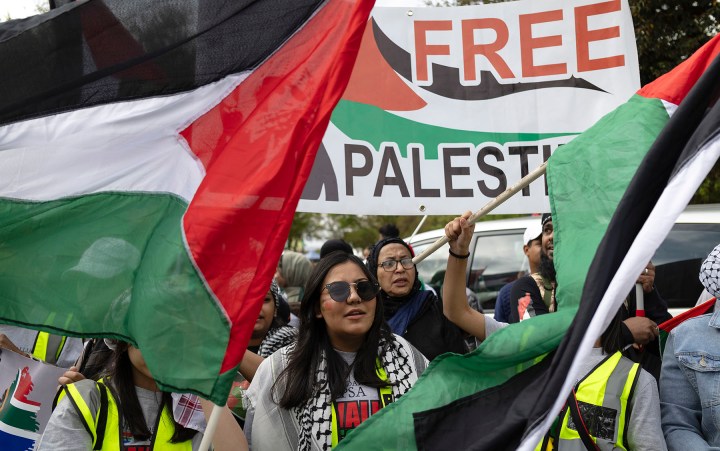
Four Wits University scholars from the Southern Centre for Inequality Studies reflect on the Israel-Gaza war and what informs their solidarity as part of the Global South community.
Finding your moral compass is a lifetime’s journey but it can be the internal guide that holds steadier in a world easily pivoted to division, intolerance and convenient pigeonholing. Four scholars share some personal insights into how they came to stand in solidarity with Palestine, and why they raise an alarm over rising anti-Semitism.
It’s facing up to the complexities of what it means to be Global South scholars at this time of conflict and how they grapple with holding complexity, contradictions and even hypocrisies. Ultimately, they share their stories to tell why, as mothers, sisters, daughters – as human beings – they don’t have the option to stay silent.
Thokozile Madonko
An art gallery is the distance of a thousand realities from the war in Gaza – the air-conditioned quiet, the ordered curation, also an exit sign because visitors have a choice to leave.
These contradictions were not lost on Thokozile Madonko when she visited the Past Disquiet exhibition at Zeitz Mocaa in the spring of 2023. It was weeks before the Israel-Hamas October war began. The documentary exhibition at the Cape Town gallery, which ends in March 2024, takes as its starting point a revisit of the 1978 International Art Exhibition for Palestine that was installed in Beirut, Lebanon, as an action and statement for museums to stand in solidarity with the Palestinian people’s struggle. Past Disquiet juxtaposes this with other struggles, including the anti-apartheid struggle.
“There was this poster of June 16 and it said something like ‘it took children dying for us to take up a grenade’. I was struck at how violence creates violence, whether in South Africa or in Palestine. Some of the photographs in the exhibition were 40 or 50 years old but they also felt very recent because of this long struggle of dispossession in Palestine. It made me very angry,” Thokozile says.

(Photo: South African History Archive / Wikipedia)
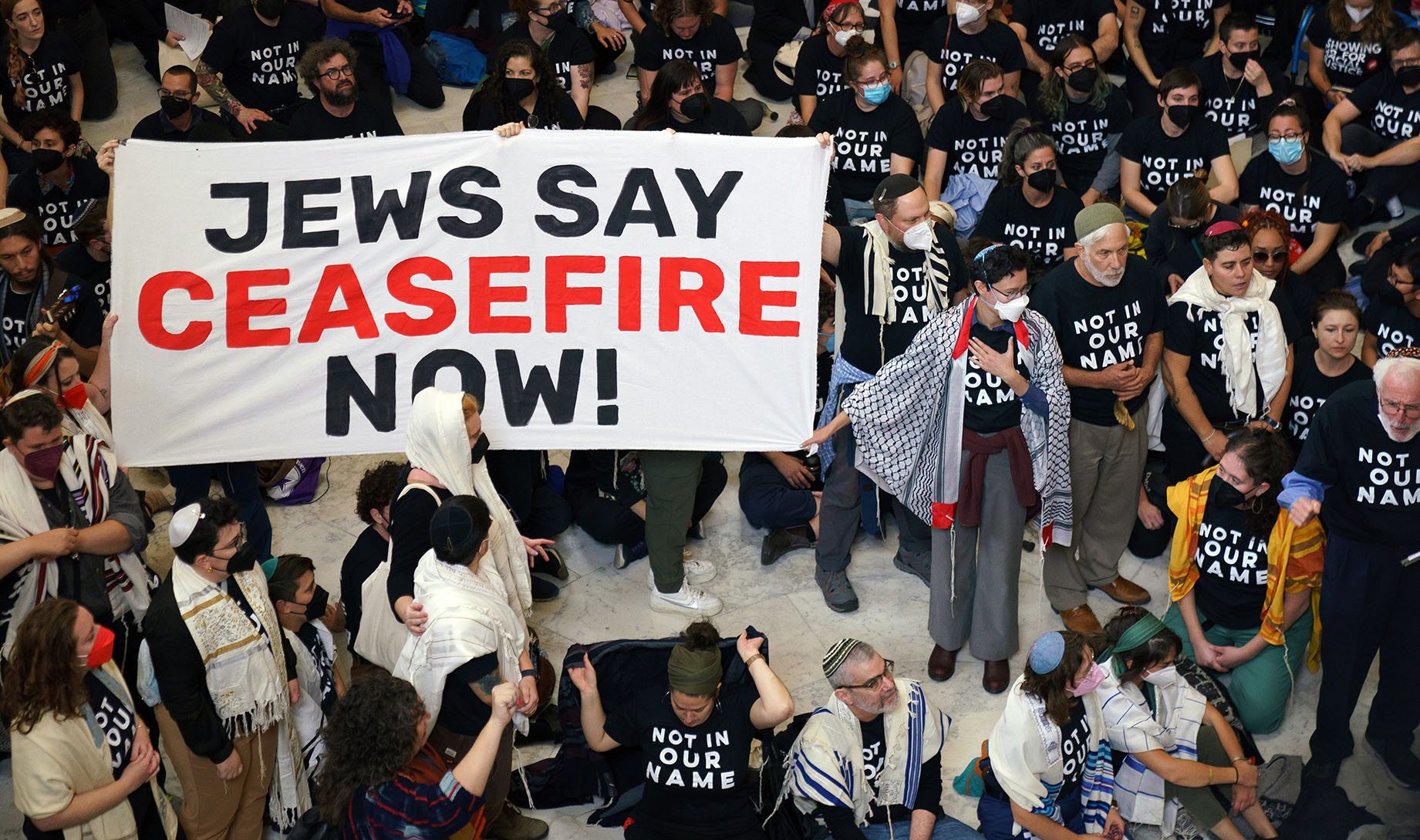
Activists from the group ‘Jewish Voice for Peace’ protest against Israel’s expected ground assault on Gaza and call for an immediate ceasefire, inside the Cannon House Office Building next to the US Capitol in Washington DC on 18 October 2023. (Photo: EPA-EFE / Will Oliver)
Then, just weeks later, war erupted in the Middle East. Thokozile knew immediately the same photos she’d seen in the exhibition would be made all over again. With each refreshed death count over the past few months, and with more images of Gaza beamed around the world, her anger rises. But this time she feels a deep professional and personal reckoning.
“My research in public economy is about poverty, inequality and social justice. But I don’t really touch on issues around dispossession of land and settler colonial histories. But the more I have engaged and learnt about this settler colonial project that is the state of Israel, the more it’s made me think about the history of my own land dispossession and the damage that gets done”.
We must carry on and believe in our actions because there is hope when we think that today apartheid South Africa was defeated; Rhodesia no longer exists.
Thokozile was born in Zambia. Her father was part of Zimbabwe’s liberation struggle against Ian Smith’s rule. But he was Ndebele and found himself “on the wrong side of history” as the post-colonial period of state-sanctioned violence became the Gukurahundi massacre.
“I always say my father died of a broken heart,” says Thokozile. It was because he had fought for liberation from Rhodesia but it had also been a fight that saw him exiled to Greece, only being allowed to return in 1992. Today, Thokozile lives in Cape Town. She has not returned to Zimbabwe for years – there’s no one there anymore, she says of the place that is her homeland too.
There are silences and invisibility that come with the passage of time, the changing power dynamics and also who gets to control the story. Thokozile reflects on how this foments into propaganda. It’s what is playing out to create anti-Palestinian sentiment, she says.
“We see it in how uncomfortable people are to speak out about what Israel is doing in Gaza, even among researchers, scholars and the university that knows the history of this country or of the armed struggle in Zimbabwe.
“There are real implications and it makes people unsure and it makes people feel like there’s undue risk to speak out. But for me we must follow the facts and be awake to what is happening on the ground in Gaza. The people in Palestine do not live politically free lives or have basic human rights. And if we believe in global solidarity and we do believe in being anti-hate then this is what we stand for.”
For Thokozile, who is mom to a teenage daughter and the daughter of a man who fought for Zimbabwe’s liberation, the war in Gaza is a reminder that she must challenge the status quo of the war and also who funds the war and the occupation. Actions too must follow, including fundraising, fellowships for Palestinian scholars, divestment, joining protests and choosing visibility, she says.
“We must carry on and believe in our actions because there is hope when we think that today apartheid South Africa was defeated; Rhodesia no longer exists. These are long struggles, but my father didn’t just accept what was put in front of him in a Rhodesia where they had no rights. It’s this that gives me energy and that I want to have a different story one day to share with my daughter.”

People walk among destroyed houses and buildings during Israeli military operation in the Al Maghazi refugee camp in the southern Gaza Strip on 19 January 2024. (Photo: EPA-EFE / Mohammed Saber)
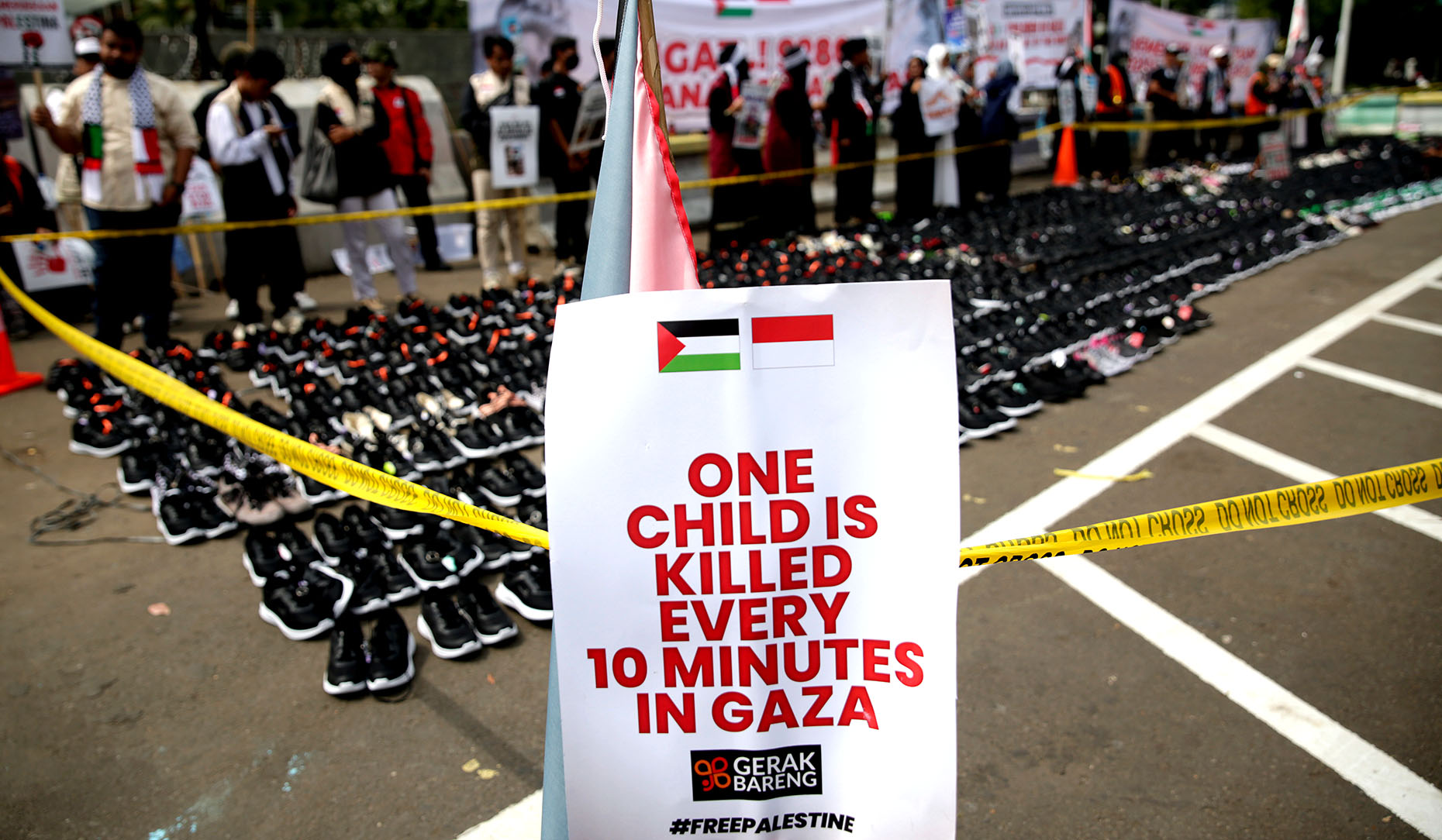
Muslim activists at a Pro-Palestinian rally held to mark 100 days of war in Gaza, in front of the US embassy in Jakarta, Indonesia, on 15 January 2024. (Photo: EPA-EFE / Adi Weda)
Arabo Ewinyu
Throwing stones looked like a lucky position to be in through the eyes of schoolgirl Arabo Ewinyu, growing up in Nairobi at the time the First Intifada of civil disobedience, protest and riots started gaining ground in Palestine in the late Eighties until the early Nineties.
“I remember seeing the images of children throwing stones and thinking how lucky they were not to have to go to school; I just didn’t understand at the time,” Arabo says.
What’s stayed with Arabo all these years are the images of children in wars. It’s how easily it’s overlooked that children are not shielded from war. They’re right in the centre of conflict, counted among the casualties and the dead, or are the ones to grow up as another generation that has to go to war.
As oppressed people in the Global South our sense of freedom is incomplete as long as there’s another similar person who is in chains.
“The Middle East conflict involves children. This war strikes at a sense of identity, of displacement, and of witnessing people being written out of history. And when you see a child take to the streets you know they understand what this means,” she says.
Arabo’s own understanding of freedom from oppression came at the moment her two older sisters received their passports for the first time. That day, she remembers, her family home filled with excited energy. Bound in the small breast pocket-sized documents were blank pages representing freedom, travel, futures and choices. But the passports came with one distinct limitation.
“My sisters would be able to travel anywhere, except South Africa, which was still under apartheid rule. They grew up in Kenya but are Ugandan by birth. In solidarity, Ugandan passport holders chose to boycott visiting South Africa. That’s when solidarity sunk in for me and the realisation that we are never free as Africans as long as Africa is not free. So, as oppressed people in the Global South our sense of freedom is incomplete as long as there’s another similar person who is in chains, who’s in oppression and cannot express themselves fully.”
Today, Arabo is a mother of a son and a daughter; her youngest is just an infant. She admits it makes news and images of pregnant mothers in Gaza under bombardment with no access to maternal healthcare difficult to process. As an economist, one of her key focus areas is how households function. She’s fully aware that the idea of household and home has been destroyed for many families because of the Israel-Gaza war.
“The war in this moment feels different somehow” – it’s hit home harder trying to come to terms that homes have been left in rubble, families obliterated and too many children have been made orphans, and some too young to know their parents’ names or even their own.
“This war has forced me to remember that people I talk about in my research, or the people I read about, are people, not subjects, who are not devoid of story or humanity. It makes the case more strongly for qualitative elements and nuance in my research.

Injured children are treated following an Israeli strike in Khan Younis, southern Gaza Strip, on 13 November 2023. (Photo: EPA-EFE / Haitham Imad)
“It’s a reminder too for me that as inequality scholars, we ultimately are talking about people and we need to be reflecting them honestly and fairly,” she says.
It’s also a moment to step up to be unequivocal as scholar activists, she says, adding: “The war is playing out in real time because of social media, but we have networks and we can communicate instantly. It means we must use these channels to apply an equal intensity of pressure along with other academic institutions and say that we as researchers, as SCIS, as the academy will not stand for what Israel is doing in Gaza.”
For her, academics taking a stand, choosing to be seen and not retreating to the anonymity of the ivory tower, allows others to see how almost everyone wrestles with their thoughts, their fears and on what taking a position means when it comes to an easily polarising issue. But, she says, when people find resonance in shared stories they might find shared humanity.
“In sharing my story about how I have come to this position, maybe it gives someone an entry point to start wondering, to start thinking about their own feelings and to become conscientised,” she says.
The academic space, Arabo says, should be where difficult conversations should be had, without fear of consequences or censorship. She owes this to herself, also to the children who are throwing stones still.
Erin Hazan
There’s a pendant of a Star of David that was given to Erin Hazan by her grandfather when she was just a baby. It’s a family tradition that the first person who sees a baby girl’s first tooth popping out is assigned to give this girl child a gift in gold. Erin hadn’t worn the necklace for years, but that changed in the days after the Hamas attack in Israel on 7 October.
“I put it on again because I thought if ever there was a time to be more overtly Jewish, that this was probably it. I put it on not as a justification, or support of the behaviour of the Israeli government, but as a way of representing myself, my religion and my ethnic group, and what this means to me with the global rise of anti-Semitism, which has honestly been terrifying. It feels right to be wearing it again, and showing my solidarity with being Jewish, while not feeling like I have to be posting all over social media,” says Erin, a PhD fellow at SCIS.
For Erin the past few months of the war have been about trying to make sense of contradictions, of expectations and assumptions, also versions of histories. And it’s a reality that hits close to home. Her father, brother and pregnant sister-in-law all live in Israel now. She worries for them but at the same time she cannot wrap her head around the fact that premature babies in Gaza were left unattended in their incubators as hospitals had to be evacuated, or the sheer number of people killed or left displaced in Gaza.
There are distinctions to be made too… that someone can be proudly Jewish but not support the Israeli government.
“I have been struggling in wanting to be supportive of my family in Israel and all that they are going through from the day of Hamas’s heinous attack, or thinking that my brother and sister-in-law have to think about how far they are from a bomb shelter at any given moment. But I’m also thinking about how to hold space knowing that what is happening in Gaza is terrible and I can’t condone mass state violence in the way that the Israeli government has been doing.
“These are not conversations I can have easily with many people. I understand their feelings and their emotions but it’s just become very hard,” she says.
As a historian and someone who does not shy away from debate, she says she’s found herself increasingly resigned to biting her tongue, bowing out of conversations and even just un-friending people on social media.

Injured children are delivered to a hospital in Khan Younis following an Israeli bombardment in the southern Gaza Strip on 26 October 2023. (Photo: EPA-EFE / Haitham Imad)
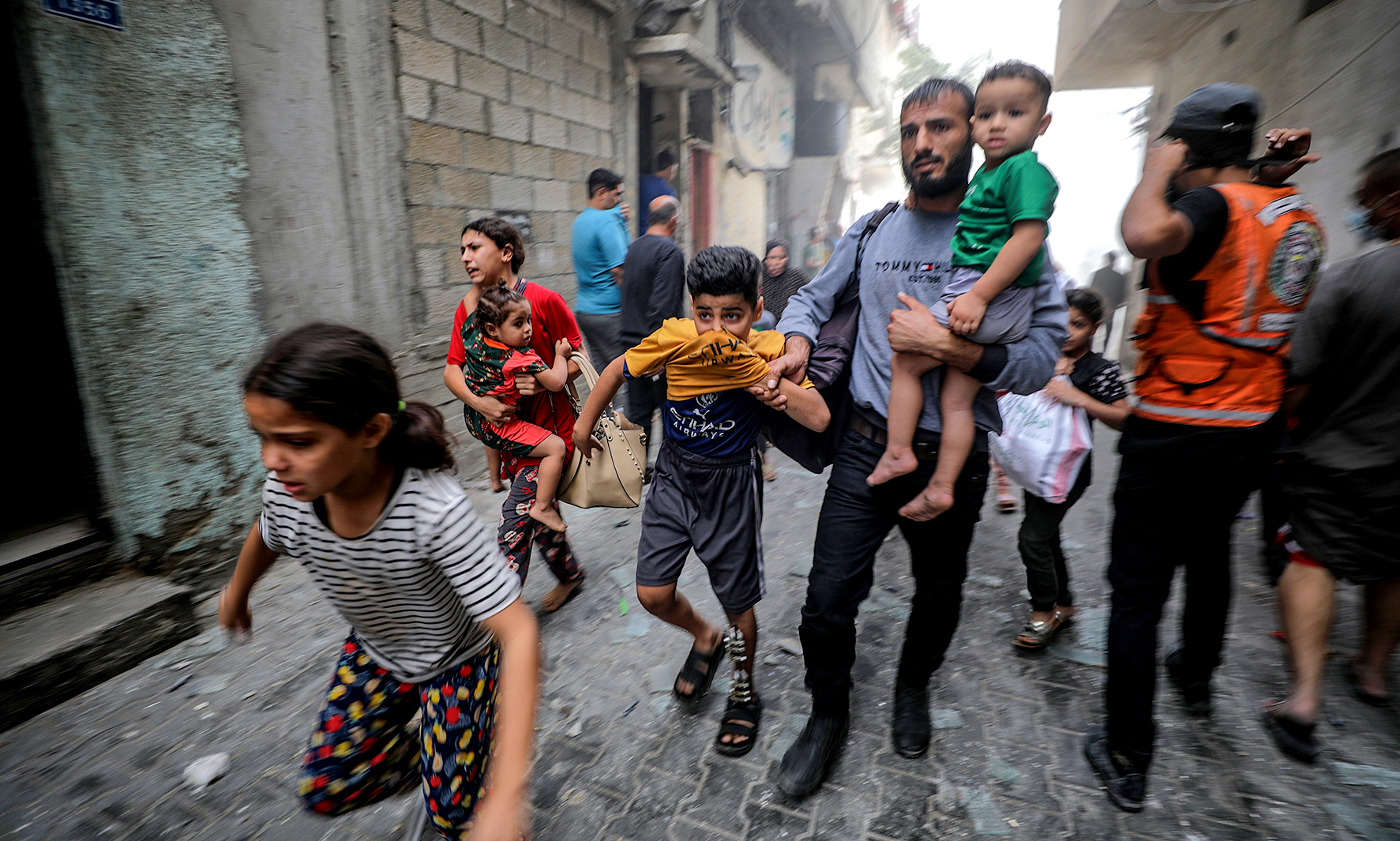
Palestinians flee following an Israeli airstrike in Gaza on 23 October 2023. (Photo: EPA-EFE / Mohammed Saber)
Erin says the war at this time in her life has made it clearer for her just how many grey areas exist in almost anything. It’s made her more determined to insist that distinctions need to be made, blind spots recognised and that some “facts” are simply historically incorrect. She says: “I’m seeing how people can justify anything and let that be what people latch onto and then anything goes. But we need to be thinking critically so that we can hear both sides, so we debate a topic, not fight each other.”
There are distinctions to be made too, says Erin. It’s that someone can be proudly Jewish but not support the Israeli government. Also, that the rise in anti-Semitic violence should be a warning bell for a world that should not tolerate more hate, and that the propaganda machinery on both sides of the conflict are always in high gear; and that any cause, protest or debate can easily be co-opted and hijacked.
For Erin, speaking her truth matters even as it makes her feel more vulnerable and more exposed. But, she says, these are her views, she does not speak for her family or her community. Her point really is that there are personal stakes for her in this globalised conflict.
So personal in fact that every day she wakes up and reaches almost immediately to scroll and look for a whale emoji among her messages. Since 2018, the year her brother moved to Israel, the siblings made a pact that, since he had decided to “go and live in a war zone” they would keep in contact every day. They settled on a whale emoji as code. It was the siblings’ personal language, a bond in a message from a big brother to say: “Today I’m okay, sis”.
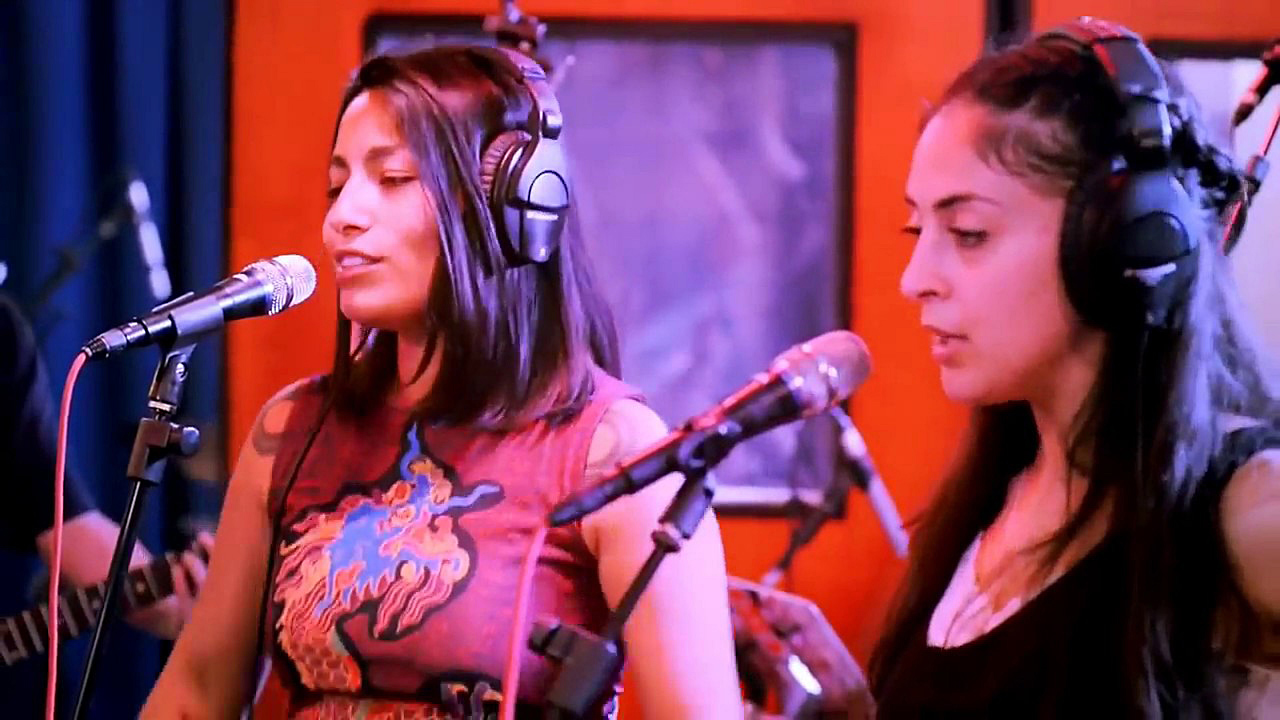
The song of resistance, ‘Somos Sur’, bought together Chilean French artist Ana Tijoux (left) and British-born Palestinian rapper Shadia Mansour in 2004. (Image: YouTube)
Ruth Castel-Branco
On Ruth Castel-Branco’s playlist is a song that’s become something of an anthem for her at this moment. It’s called Somos Sur.
“We are South,” says Ruth, translating the title of a song of resistance and solidarity that in 2004 brought together Chilean French artist Ana Tijoux and British-born Palestinian rapper Shadia Mansour – it’s also stating her position.
“The song is a call to action for solidarity among those of the Global South. It’s the stuff of our debates as we look for a southern response to the war in Gaza.
“The idea that ‘we are South’ recognises the common experience of colonisation and evokes pride in the ongoing struggle for liberation and self-determination,” says Ruth, a senior researcher and lecturer at SCIS.
Ruth was part of the first generation born in an independent Mozambique – after 1975. She reflects on the experience of growing up in a revolutionary moment, marked by hope and possibility, in the construction of a new society.
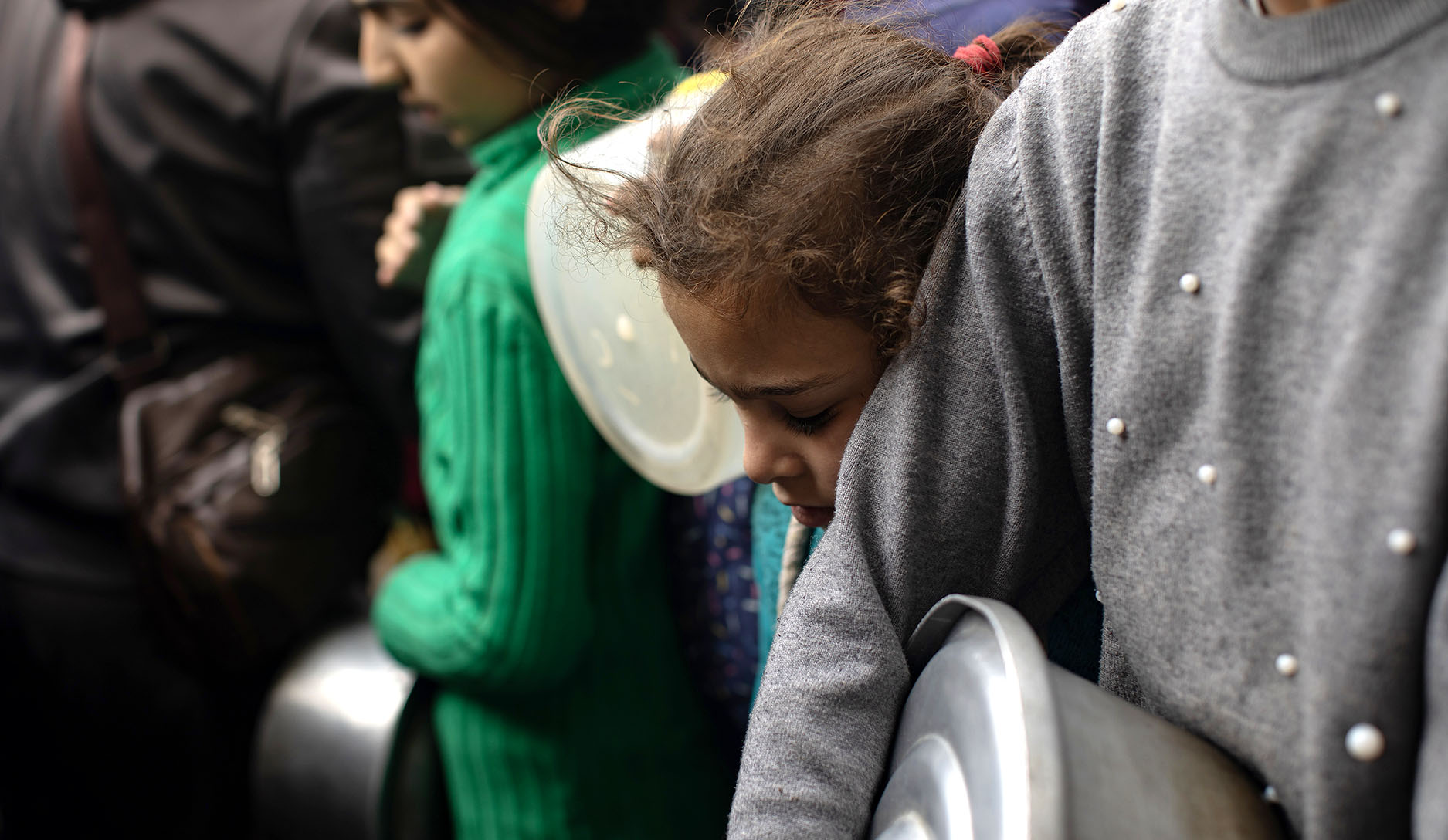
Palestinians line up for free food provided by a Palestinian youth group for displaced people in the Khan Younis refugee camp on 9 January 2024. More than 22,800 Palestinians and at least 1,300 Israelis have been killed, according to the Palestinian Health Ministry and the Israel Defense Forces, since Hamas militants launched an attack against Israel from the Gaza Strip on 7 October 2023, and the Israeli operations in Gaza and the West Bank that followed. (Photo: EPA-EFE / Haitham Imad)
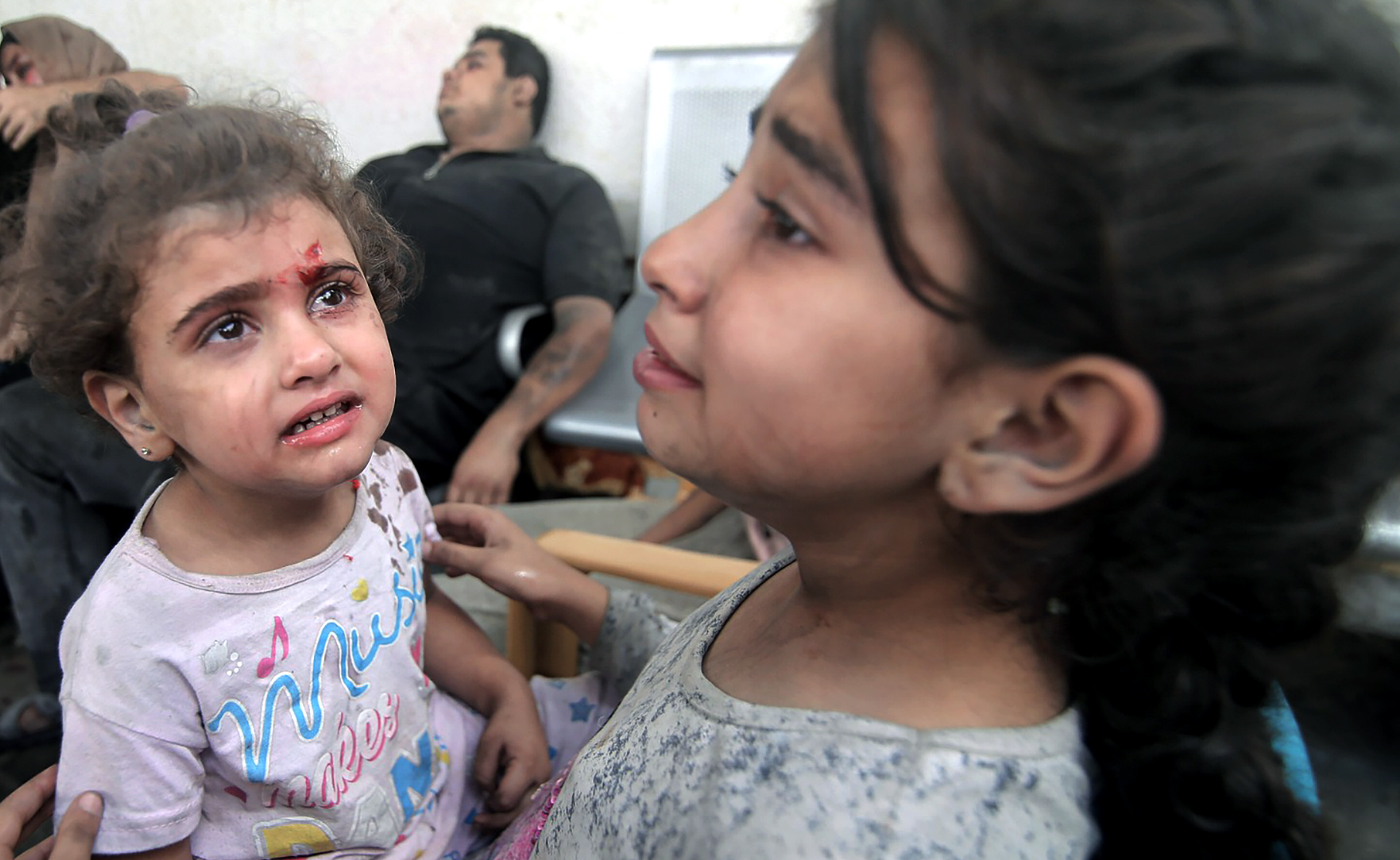
An injured Palestinian child waits at a hospital to be checked as battles between Israel and Hamas continue for the sixth consecutive day in the city of Rafah, in the southern Gaza Strip, on 12 October 2023. (Photo: Ahmed Tawfeq apaimages / Gift of the Givers Palestine)
But civil war broke out shortly after independence, backed by the apartheid regime, intent on destabilising the newly independent state. The war dragged on for 16 years, killing hundreds of thousands and displacing millions.
“I witnessed how war destroyed families, the fabric of society and the future of our country. Those experiences were horrifying but they also offered me a level of empathy with people who experience war,” she says.
We are the product of all our experiences; we’re also the product of other people and therein lies profound hope.
It’s made watching the pace and magnitude of the war unfold in Gaza hit home with dreadful profundity. It also means she is steadfastly focused on keeping up pressure on calling out Israel’s flouting of international conventions, and its political hypocrisies. It’s also a rejection of Israel’s military tactics that have left hospitals, schools and universities flattened and thousands of civilians dead.
She draws parallels between colonialism and what Israel is doing in Palestine. The language Israeli officials use to refer to Palestinians is evocative of how the Portuguese colonialists referred to Mozambicans. The differentiation between “civilised and uncivilised”; “lightness versus darkness”, for example, these create the foundations for a racist regime that permeates all corners of society.
Read more in Daily Maverick: Israel-Palestine War
As a teacher, she says, it’s her role to foster a transgressive space that enables students to wrestle with questions of power. “Regardless of the conclusion they may reach, it’s about creating the space, offering information and giving students the tools to think critically.”
As a white Mozambican – the descendant of Portuguese colonisers but also of people who were colonised – Ruth has had to wrestle with her place in a postcolonial society. “It is easy to turn to avoidance as a strategy of self-preservation. But particularly as a scholar, I have the responsibility to confront this discomfort, to challenge oppression, and to contribute to a critical pedagogy.
“We are the product of all our experiences; we’re also the product of other people and therein lies profound hope. We impact each other and therefore we can transform our world. It might take our lifetimes, but so be it, it’s the spirit with which I come to this.”
Transformation can start small, as small, maybe, as sharing a song like Somos Sur – but recognising the role of creative expression, of collaboration and of raising the volume of voices that carry the message of solidarity and justice. DM
Ufrieda Ho is a former SCIS/Cameron Schrier Foundation fellow.


















This anti “western hegemony” is getting extremely tiresome. Doubly so because the loud hailers appear to think the “global south” is the counter balance. The only thing bipolar about that argument is a clinical diagnosis as such of the leaders of the global south.
1. The west is not the west, let’s get geography squared. It includes Japan, South Korea, Australia, Singapore and some South American nations.
2. The VAST majority of the “global south” is not in fact south of anything but the north pole. China plus India, do the math.
3. The actual difference is not west and south, it is defined by personal, religious, economic freedom and the rule of Law. The west has, the south does not.
Witness the millions of people risking everything to get into the “west” and figure why the expanded BRICS (china, india, brazil, saudi, iran, etc) does not have a challenge dealing with asylum seeking refugees overwhelming their welcoming embrace.
People vote with their feet and boats when autocratic governments don’t allow them to vote at the ballot.
Yes professor Buys … ‘they’ are trying to get into the ‘west’ because that is where the the colonialists took all the wealth they stole and plundered from the colonies, and continue to do so today. Today the other ‘they’ continue to subjugate the ‘rest’ with economic policies designed to keep them in subjugation. “The west has” … world war one and two (a battle of the white tribes across Europe) into which various colononies were obliged to participate. So continue getting “extremely tiresome” … but it will not contribute to any enlightenment .
The point is that Russia and China do not have a problem with refugees flooding in to their countries but Europe does. This cannot be answered by stating that that’s where the colonialists took the money, but maybe by the fact that these are the countries that offer opportunity for a better life.
Post-Uhuru Africa has had over 60 YEARS to generate wealth and, yet, it has gone backwards in just about every metric of human and economic development.
The net effect of liberation is that all Africa’s best and brightest have left for the West and the rest of its population will hazard a dangerous and illegal journey to get to the West by any means.
Kanu, why do you think this is the case?
Try a different tune redwood, that one ran sour years ago
You need to talk to some of the people that have left SA ,other african countires and war torn countries in the middle east for countries in Europe, the USA and Australia. They are not looking for the stolen “colonial money” but instead for a better life, where things may not be perfect but where they just work better. Better security, education, health care, job opportunities etc etc etc. Other previous colonoial countries like Singapore and South Korea embraced what the colonial powers had left behind and built world class economies – why can’t we do this is in Africa? Maybe the reason is that every African politician thinks only about the money he/she can steal from their countries and does not care a jot about the people. So, istead, the money that should be used for development is used for Bentleys and a lavish lifestyle. Yep, the white tribes of Europe and America have fought many many wars but out of the ashes they have built world class cities , technologies and lifestyles that others aspire to.
Say no more
so much bitterness. Your failures in life are your own doing, no one else’s
It is indeed only Africans that are looking backwards to try and get a better future. Only Africans are still crying about slavery, colonialism and loans that must be repaid to the IMF/World Bank/commercial banks.
It is indeed very difficult to go forward when you keep on looking back.
A very one-sided article dressed up in academic tones. What about the atrocities committed by Hamas?
Wow?… you actually want to compare the both? You have resistance fighters that committed aggression in apartheid israel with the sole aim of taking prisoners for exchange, These Hamas freedom fighters targeted mainly military facilities. Unfortunately civilians died by being caught in crossfire but more so by IDF indiscriminate firing on them. No rapes of babies killed. It still amazing, with social media so vast, people like yourself are still blind and buy into israel propaganda
No, Hamas targeted civilian facilities as well and murdered innocent people. Whilst I take the IDF version of the events of the 7th with a pinch of salt your version requires a tablespoon instead.
Disgusting comment
Something else that is getting rather tiresome is this constant peddling of the idea that settler colonialism is inherently connected to “whiteness”. Far from being a prototypical “Western evil” solely perpetrated by white nations against Black and brown peoples, settler colonialism has no links to any specific culture. There are plenty of examples: Moroccans settling in Western Sahara, emancipated slaves from the American Civil War displacing the local population in Liberia, 270,000 Japanese settling in conquered Manchuria during the 1930s, or Indonesia’s resettlement of 300,000 farmers in West Papua in the 1970s and ’80s, following Indigenous uprisings in that state.
These children haven’t done their homework.
If it is not on their phones, it cannot be true.
So easy to gaslight children.
And are you the ‘child” ?
Time to put an end to white guilt – it just perpetuates the victim mentality.
You would have to go a very long way to find drivel like this article.
Ai! Children. So easily to gaslight.
You’re not making any sense. Is that the best you can come with?
It is your kind of whataboutism that is the problem … try some other deflection !
Ah, yes … ‘whataboutism’. Another word that’s rapidly losing power through overuse and misapplication. That, and whoever doesn’t agree with your pet conviction being part of ‘the problem’. Which of the myriad of problems facing humanity at the moment is the problem that trumps all other problems? Nope, it’s not stupidity. I’d say greed and its ugly sister hubris is pretty high up the list, but I digress. My point Kanu, is that by resorting to insults (subtle or otherwise) instead of speaking to the points of an opposing argument is, in a way, deflection.
your new favourite phrase redwood?
Nah. Not really. Yours is ‘redwood’ though, redwood.
Piet, redwood is my pet name for the one with the biggest chip on his shoulder
we all cant stay silent as apartheid Israel openly commits genocide with their discriminate bombing and slaughter of palestinians
Read my lips: IT IS NOT GENOCIDE and the ICJ did not say it was.
Read the ruling, the ICJ said that it is plausible that it is Genocide.
Ai John, really stretching again. The ICJ said it”may” be plausible” ot that it “is” plausible. Stop embarrassing yourself
To correct myself and you the wording is “some of the rights asserted by South Africa are plausible” We need to wait for the courts final ruling which could takes months or even years.
The major point of the ruling though is that Israel was, in clause 78, instructed to to take all measures in it’s power to stop killing or causing physical or mental harm to all members of the group.
No it wasn’t, the ruling stated it had to comply with it’s obligations under the Genocide Convention – what you’re saying is not the same thing. You can’t cherry pick pieces of the ruling that suits your narrative just like the cherry picking of the history of the region to suit the fake narrative
Gaza’s population has more than doubled in the past 10 years. The number of people allegedly killed in Gaza is less than 1.2% of the total population. If Genocide was the aim as you so much want it to be, they’re doing a really bad job
It is sad if these are academics. It seems they lost the ability to read what is happening around them. Israel has been trying to get a ceasefire going for more than a month. It does not suit Hamas.
If they are scholars, I am sure they would looked at the possibility that Hamas leaders considered the possibility that Israel would do what they are doing when they planned the Oct 7 massacre. It was Hamas that refused to extend the original 7 day ceasefire. It is now Hamas that is taking it’s sweet time to consider the month old proposal for a 6 week ceasefire.
These one sided views at our universities must set off red lights and alarms. Surely these educators cannot be allow to spew their views in the classroom.
Hamas refused to extend the ceasefire because Israel refused to discuss the release of male detainees.
They have not accepted the current Israeli offer because it is only for a temporary ceasefire in the hopes of getting the hostages released while offering the minimum possible exchange of Palestinian detainees. As soon as Israel has the hostages they will just carry on with the war.
I am fascinated by the way October 7 is repeated even in reverse but with Israel it’s everyday shock and the counting is going to tens of thousands.
We are forced to look at the definition of Genocide whilst we look at it with our eyes.
We deny the IDF was instructed to wipe out all the Palestinians because they are all guilty but the Israel president said so.
We try to explain Israel from the river to the sea comment by Israel leaders but the prime minister presented a new map to the UN without Palestine.
We must really be bored.
Oooh, some wild exaggeration there! There have been no verified numbers for Gaza since the beginning of the conflict so no one really knows how many have died. Lets say for a moment that the latest “number” of 25,000 is true (doubtful and even that does not list combatants) then they percentage of the poplulation of Gaza killed in the conflict is less than 1.1% ergo the claims of genocide don’t hold up, if that were the intent then they’re doing a really bad job
Gaza’s population has doubled in the past 10 years – tell me how that fits into your genocide fabrication
A couple of entitled brats from Wits hardly represents the opinion of the global south
Why they cannot keep silent – empty tins ALWAYS make noise.
These global South scholars are confused about the parts of the world that have human rights especially freedom of speech.
Alas, facts are the last thing on their minds